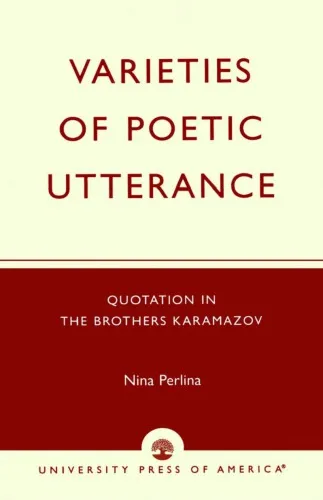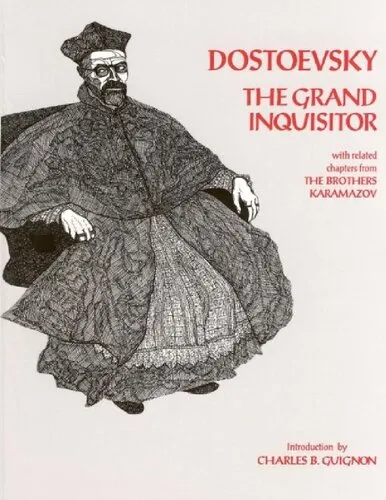Varieties of Poetic Utterance: Quotation in The Brothers Karamazov
4.0
Reviews from our users

You Can Ask your questions from this book's AI after Login
Each download or ask from book AI costs 2 points. To earn more free points, please visit the Points Guide Page and complete some valuable actions.Related Refrences:
Persian Summary
Introduction to 'Varieties of Poetic Utterance: Quotation in The Brothers Karamazov'
Welcome to an insightful exploration of one of Dostoevsky's most profound works, "The Brothers Karamazov". This book, 'Varieties of Poetic Utterance: Quotation in The Brothers Karamazov', delves into the rich tapestry of quotations interwoven throughout Dostoevsky's narrative. This analysis reveals the intricacy of his linguistic artistry and the depth of his philosophical inquiries. With a meticulous study of the use of quotations, this book invites readers to a deeper understanding of Dostoevsky’s themes and artistry.
Detailed Summary of the Book
'Varieties of Poetic Utterance' is a comprehensive examination of how Fyodor Dostoevsky, in his magnum opus "The Brothers Karamazov", employs the device of quotation to enrich the narrative and engage the reader in complex philosophical and existential dialogues. The book dissects the different types of quotations found throughout the novel, analyzing their origins, contexts, and the impact they have on character development and thematic enhancement.
The study begins by situating Dostoevsky within the broader literary tradition and examines the dialogic nature of his storytelling. By integrating quotes from biblical, philosophical, and literary sources, Dostoevsky creates a network of voices that reflect and challenge each other, thereby fostering a dynamic narrative space. The book scrutinizes how these intertextual connections highlight the multifaceted human experience and provoke profound moral questions.
Key Takeaways
- Quotation serves as a significant narrative device in Dostoevsky's work, enhancing thematic depth and character complexity.
- The integration of religious and philosophical texts invites readers to participate in a larger existential discourse.
- The dialogic nature of Dostoevsky’s prose, facilitated through quotation, mirrors the novel's exploration of free will, faith, and morality.
- Understanding the varied sources of quotations enhances appreciation of the novel's intricate and layered storytelling.
Famous Quotes from the Book
While 'Varieties of Poetic Utterance' provides extensive analysis rather than introducing new quotes, it emphasizes significant passages from "The Brothers Karamazov", such as the Grand Inquisitor and reflections on suffering and faith, illuminating their enduring impact on literature and philosophy.
Why This Book Matters
This scholarly work is essential for both literary enthusiasts and academics as it sheds light on the intricate narrative techniques employed by Dostoevsky. By focusing on quotation, the book provides a unique lens through which readers can explore the novel's multifaceted dialogues and ideological confrontations. Such an exploration encourages a deeper understanding of Dostoevsky's interrogation of the human condition, making it a vital resource for those studying Russian literature, intertextuality, and the evolution of narrative form.
'Varieties of Poetic Utterance' is more than just a treatise on literary device; it is a discourse on the interconnectedness of texts and ideas across time. By engaging with this work, readers gain insight into Dostoevsky’s profound commentary on life’s greatest questions, enhancing both their comprehension and appreciation of one of history’s literary masterpieces.
Free Direct Download
You Can Download this book after Login
Accessing books through legal platforms and public libraries not only supports the rights of authors and publishers but also contributes to the sustainability of reading culture. Before downloading, please take a moment to consider these options.
Find this book on other platforms:
WorldCat helps you find books in libraries worldwide.
See ratings, reviews, and discussions on Goodreads.
Find and buy rare or used books on AbeBooks.
1409
بازدید4.0
امتیاز50
نظر98%
رضایتReviews:
4.0
Based on 0 users review
"کیفیت چاپ عالی بود، خیلی راضیام"
Questions & Answers
Ask questions about this book or help others by answering
No questions yet. Be the first to ask!



